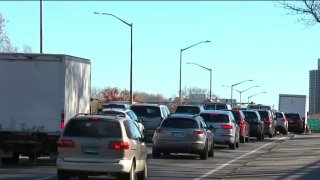
AAA says during a four hour stretch on Wednesday, the Long Island Expressway has more traffic than anywhere in the country. Parts of the LIE were already at a crawl in the afternoon, with bumper-to-bumper traffic expected to drag on for hours.
Some municipal leaders and state legislators are raising concerns about Connecticut Gov. Ned Lamont's election year proposal to lower the state's cap on local taxes for motor vehicles, worried cities and towns could ultimately wind up losing much-needed revenue while wealthier drivers might benefit the most from the plan.
Sen. Cathy Osten, D-Sprague, co-chair of the General Assembly's powerful budget-writing committee, said state policymakers have tried to cap car taxes in the past, promising cities and towns would be reimbursed for lost revenue, and it hasn't worked.
“We have done this before and then two years later, we come back and say, ‘We really can’t afford to give the municipalities that money,’ and then we raise the cap on cars,” she said during a public hearing on the bill Friday. “I fear that’s exactly what’s going to happen here.”
Osten's concerns have been echoed by some municipal leaders, who've expressed skepticism about the bill's promise to keep cities and towns financially whole.
Get Connecticut local news, weather forecasts and entertainment stories to your inbox. Sign up for NBC Connecticut newsletters.
“Without a fail-safe mechanism for fully reimbursing municipalities for lost property tax revenues, capping car taxes will simply shift an even greater burden onto already overburdened homeowners and small businesses,” said Betsy Gara, executive director of the Connecticut Council of Small Towns, in written testimony. She said local officials in small towns worry the state's reimbursement will be “phased out over time or swept completely when the state faces challenging budget years.”
The critiques were lodged the same day the Democratic governor went on the road to tout his legislative tax-cutting package. Lamont is wading into a long-running debate in Connecticut over how best to reduce or even eliminate unpopular local car taxes, an important money-maker for cities and towns that generates an estimated $1 billion in revenue each year.
Under Lamont’s plan, the existing property tax cap of 45 mills on motor vehicles would be lowered to 29 mills. One mill is equal to $1 of every $1,000 of assessed property. Martin Heft, undersecretary of the state’s Office of Policy and Management, said Lamont’s proposal would reduce car taxes on 1.7 million vehicles in 103 municipalities, including 20 of the state’s 25 economically distressed municipalities.
Local
“The most merciless tax out there is the property tax on your car and on your home. It’s a tax that you pay good times and the bad. The tax you pay when there’s COVID and when there’s no COVID. It’s a tax that is relentless," Lamont said during a news conference in South Windsor. “And that’s one of the higher taxes relative to our peers that Connecticut has so we’re trying to make up for some lost time.”
Nora Duncan, state director of AARP of Connecticut, praised Lamont's efforts at Friday's event, saying it's a step toward reducing the tax burden on older residents and making the tax more predictable.
Considering local property tax rates vary among the state's 169 cities and towns and the value of used motor vehicles has increased significantly during the pandemic, Lamont has proposed a separate companion bill, said Heft. Under that plan, which is also awaiting legislative action, the value of motor vehicles would be converted from average retail value to manufacturer's suggested retail price, with a 20-year depreciate schedule.
In written testimony, Heft predicted the proposed change will create a more fair system where motor vehicles are valued across Connecticut using the same methodology and owners will have a value that is predictable for the life of the vehicle. That, he said, would end the current situation where taxpayers are sometimes surprised to receive bills that includes a value for their car that's higher than the previous year.
Osten, however, said she remains skeptical the governor's plan will work and predicted it will ultimately provide greater relief to wealthier taxpayers with more expensive vehicles. She suggested the state simply stop taxing vehicles worth $10,000 or less.
“That would immediately help out people who own used vehicles of lesser value,” she said, “and it would provide them with some significant savings.”